Considering a Career in Allied Health But Don't Know Where to Start?

If you want to make a difference in peoples’ lives, a career in allied health is an excellent option. This rewarding career path enables you to work in the healthcare community, meet people from all walks of life, and help them along their healing journey.
Apart from being personally rewarding, these professions come with great pay, job security, and respect within the community — all with less demanding and rigorous training than you’d need to enter the medical profession.
What is allied health?
‘Allied health’ is an umbrella term covering the broad range of non-medical health professions that aren’t medical doctors, nurses, or dentists. Allied health professionals (AHPs) are healthcare practitioners, such as physiotherapists or audiologists, who provide health services. They often work as part of a multidisciplinary healthcare team.
Allied health professionals are an integral part of our health system in Australia. Demand for skilled, dedicated professionals is booming across the health, aged care, mental health, and disability sectors. They assist patients in recovering from illness or injury, managing chronic illnesses, and maintaining their overall health and well-being.
Because of this holistic, long-term focus, they can help avoid the need for medical intervention altogether. In turn, this lifts some of the strain from the medical system.
What’s a career in allied health like?
Careers in allied health can be extremely rewarding in several ways.
Imagine seeing a patient who has suffered a stroke get back on their feet, and knowing you helped them through that journey. Or helping a young child go through rehabilitation until they can finally move around and do what they want to do. If you’re drawn to helping people, the look on their parents’ faces will give you a feeling that money can’t buy.
Meaningful
Practitioners often say that helping people to heal gives them great job satisfaction. You’ll be challenged by working with different patients of all ages, abilities, and backgrounds, who will often come in feeling nervous until you put them at ease.
Well-respected and well-paid
Using your expertise, you’ll have the authority to plan patients’ care pathways without oversight from others. You’ll make good use of your skills and knowledge to have a big impact on people’s lives. And you’ll be rewarded financially for your expertise and responsibility.
Connected
Not only will your job center around helping people, but you’ll be well-supported by your colleagues — who are likely to be caring, compassionate people themselves.
Flexible
Allied health jobs are more flexible than many other professions. And compared to other jobs in the healthcare field, the training is much faster. While many medical jobs require a postgraduate degree, plus years of vocational training, you can get into many allied health jobs with a three or four-year bachelor’s degree. Allied health assistant jobs are a great way to get started in the industry and only require a Certificate III.
Jonathan Moody
CEO and founder, Physio Inq
Who are allied health professionals in Australia?
There are countless career opportunities in allied health. Depending on the field you choose, you could end up working in all kinds of care settings: a hospital or private clinic, in a rehabilitation center, aged care facility, community health clinics, or even at a university or school.
So, what jobs are considered allied health in Australia?
- Social workers
- Physiotherapists
- Counsellors
- Psychologists
- Occupational therapists
- Speech pathologists
- Dental assistants
- Optometrists
- Sonographers (Ultrasound)
- Podiatrists
- Chiropractors
- Pharmacy assistants
- Dietitians
- Exercise physiologists
- Pathologists
- Audiologists
- Medical radiation therapists (X-rays)
- Osteopaths
- Indigenous/Aboriginal and Torres Strait Islander health workers
- Music therapists
- Nutritionists
- Orthotists & prosthetists
- Allied health assistants
Sources: Department of Health and the AHPA
What is the difference between the medical and allied health professions?
Allied health is different from traditional medicine. To start with, roles in allied health do not require a medical degree (with the exception of pathologists).
Medical professionals, such as doctors, nurses, dentists, and pharmacists, draw on their knowledge of health science to diagnose and treat symptoms. Roles in the medical field usually require extensive training. For example, surgeons and psychiatrists have to train for 13-15 years.
Though they often work with doctors, allied health professionals are independent practitioners who can make their own decisions without supervision. They take an evidence-based approach, using an internationally recognised body of knowledge. Some have postgraduate degrees, while others may have Certificates, Diplomas or Bachelors.
The national voice for allied health professionals, Allied Health Professions Australia, defines allied health professions as:
- Healthcare professionals
- Not in the medical, nursing, or dentistry professions
- Direct patient-care roles
- Having a direct scope of practice
- Having a national professional organisation, code of ethics, and membership requirements
- Having national standards of competence and assessment
- Having regulatory mechanisms
The AHPA also defines allied health professionals as being university-trained. They don’t, however, include roles such as Indigenous health worker (who need to hold a Certificate IV) in their list of allied health professions, whereas other government departments do.
What is the difference between the medical and allied health professions?
Nurses are part of the medical profession. By definition, they are not allied health professionals. The main differences are:
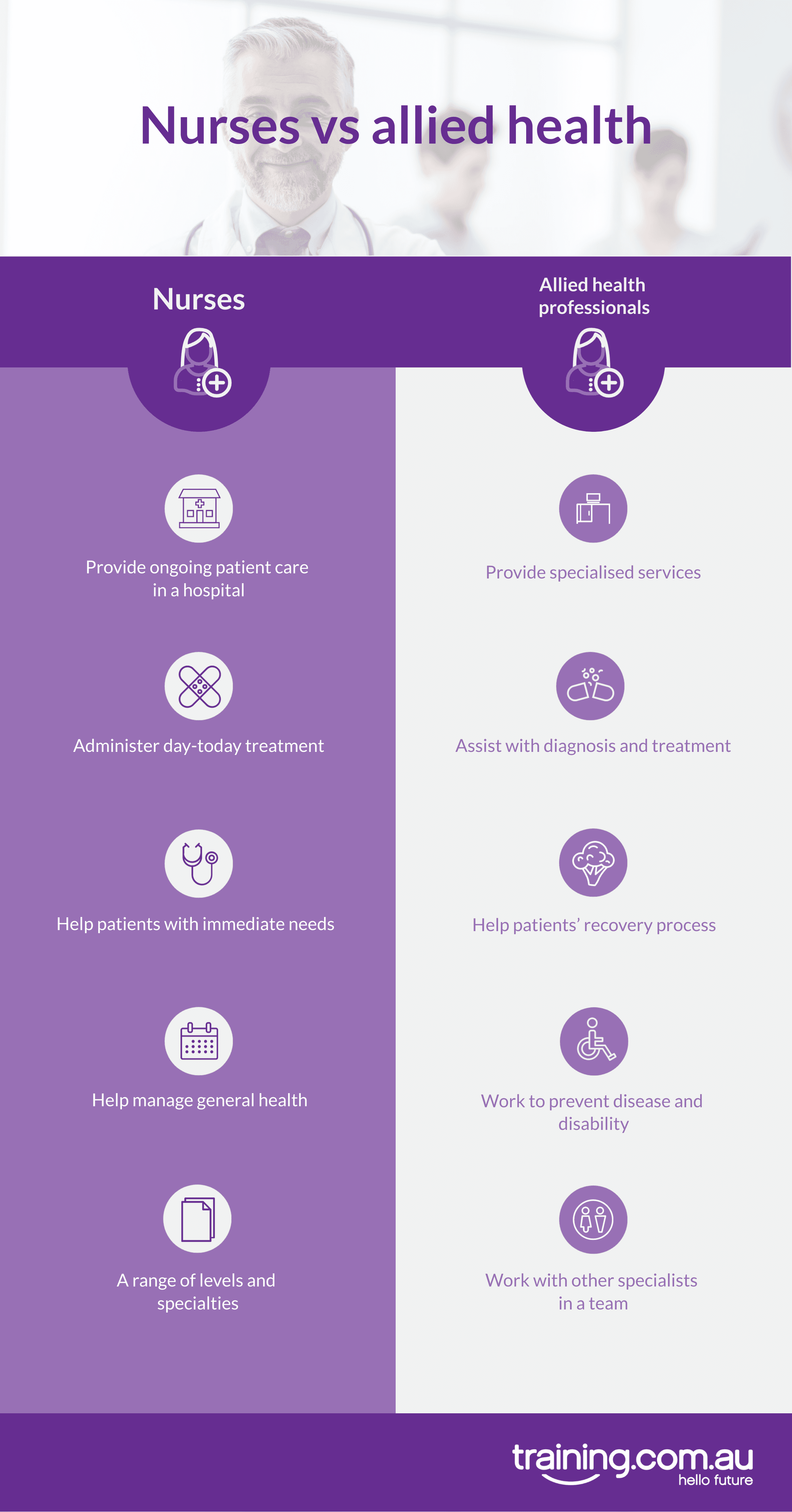
Nurses:
- Provide ongoing patient care in a hospital
- Administer day-to-day treatment
- Help patients with immediate needs
- Help manage general health
- Have a range of levels and specialties
Allied health professionals:
- Provide specialised services
- Assist with diagnosis and treatment
- Help patients’ recovery process
- Work to prevent disease and disability
- Work with other specialists in a team
Salary expectations for allied health jobs
Salaries can vary significantly in Allied Health, particularly depending on what field you choose and where you are employed. Here are the average salary ranges for allied health jobs in Australia, in order of highest median salary to lowest:
Occupation |
Low |
Median |
High |
Qualification needed |
|---|---|---|---|---|
Medical radiation therapists |
$64,356 |
$122,408 |
$146,358 |
Bachelor of Applied Science (Medical Radiations) |
Sonographers |
$111,794 |
$122,408 |
$156,000 |
Graduate Diploma in Medical Ultrasound / Diploma of Diagnostic Ultrasound / Masters of Medical Imaging |
Exercise physiologists |
$70,035 |
$108,888 |
$151,250 |
Bachelor of Clinic Exercise Physiology / Master of Applied Sports Science / Graduate Certificate of Strength and Conditioning |
Optometrists |
$85,450 |
$105,065 |
$151,000 |
Postgraduate qualification in Optometry |
Nutritionists |
$76,414 |
$103,584 |
$111,774 |
Diploma of Nutrition / Bachelor of Science majoring in Nutrition |
Dietitians |
$76,414 |
$103,584 |
$111,774 |
Master of Dietetics |
Orthotists & prosthetists |
$76,148 |
$97,552 |
$113,031 |
Bachelor of Applied Science or Health Science majoring in prosthetics or orthotics |
Psychologists |
$84,389 |
$96,564 |
$130,198 |
Multiple pathways available, 6 years minimum study |
Social workers |
$70,177 |
$95,108 |
$116,317 |
Masters in Social Work |
Speech pathologists |
$72,397 |
$95,004 |
$117,345 |
Bachelor of Speech Pathology / Master of Speech Pathology |
Audiologists |
$57,935 |
$95,004 |
$126,750 |
Master of Clinical Audiology |
Pathologists |
$72,444 |
$88,183 |
$120,129 |
A medical qualification, plus further training with the Royal College of Pathologists of Australasia |
Counsellors |
$69,967 |
$82,368 |
$117,000 |
|
Indigenous health workers |
$64,428 |
$82,056 |
$84,859 |
Certificate IV in Aboriginal and Torres Strait Islander Primary Health Care |
Chiropractors |
– |
$81,840 |
– |
Master of Clinic Chiropractic |
Occupational therapists |
$70,000 |
$81,588 |
$104,146 |
Bachelor of Occupational Therapy |
Podiatrists |
$72,623 |
$81,110 |
$126,750 |
Bachelor of Podiatry |
Physiotherapists |
$70,000 |
$80,999 |
$120,383 |
Bachelor of Physiotherapy / Bachelor of Applied Science (Physiotherapy) / Master of Physiotherapy |
Osteopaths |
$70,000 |
$79,000 |
$103,350 |
Master of Osteopathic Medicine |
Allied health assistants |
$52,595 |
$62,400 |
$70,760 |
Data sources:
Median from JobOutlook.gov, balanced against data from job sites Indeed and au.talent.com. Salary ranges from au.talent.com.
What are the highest paying allied health careers?
Sonographers, medical radiation therapists, exercise physiologists, optometrists, dietitians, and nutritionists earn the highest median salaries of the allied health jobs, all bringing in a healthy average of six figures.
Sonographers, exercise physiologists, and optometrists have the highest earning potential, with the high end of their salary range reaching past $150,000.
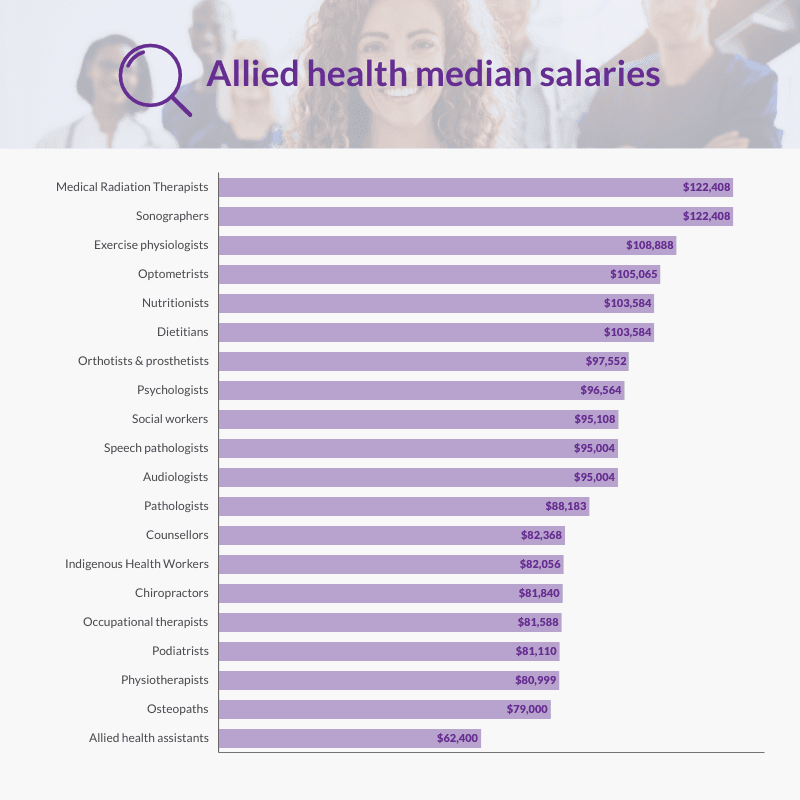
What allied health careers are in demand?
These allied health careers are growing very strongly, according to the Australian government’s employment projection data. They are ordered in size, starting from the largest occupational group.
Social workers
40,300 workers (Very strong growth)
Physiotherapists
31,900 workers (Very strong growth)
Counsellors
26,800 workers (Very strong growth)
Occupational therapists
16,300 workers (Very strong growth)
Hayley Parcell
Head of Healthcare Operations & Development at Microba
Types of allied health jobs in Australia
While getting into allied health services can be an exciting career move, how can you decide which field is best for you — especially when you’ve got no experience?
This list of potential allied health positions will give you more of an idea of the areas open to you – and what each involves. Keep in mind that you can develop a career as any one of the below. On the other hand, you can be employed as a support worker or assistant to a qualified physician.
Occupational Therapy
Occupational therapists assist children and adults with illnesses or disabilities to function in their daily lives and activities. They can help with everyday duties like eating and dressing, or with other things like exercise and recreational activities. Occupational therapists are in high demand, making career prospects strong.
Audiologist
Audiologists help people with hearing disabilities. They conduct hearing tests, determine causes of hearing or balance loss and provide solutions. They can work in hospitals and clinics, and be involved in research and development, too.
Podiatrist
Thinking you’d like to know more about feet, legs, toes, and how they work (or don’t work)? Podiatrists treat various foot conditions, from skin or nail conditions to muscular conditions.
Nutritionist or Dietitian
Nutritionists and dietitians work with patients to advise them on good health and/or manage illnesses such as cancer, diabetes, obesity, or an eating disorder. In Australia, dietitians require additional dietetic qualifications and study and are qualified to work in a medical capacity.
Speech Pathologist
Speech pathologists also assist children and adults in overcoming speech and swallowing difficulties. They can help treat disorders such as autism or stuttering or work to rehabilitate patients after strokes.
Orthotist
An Orthotist is responsible for orthotics or prosthetics, otherwise commonly known as artificial limbs. Orthotists work with a range of people in fitting, managing and getting used to prosthetics.
Allied health degrees and qualifications
Certificate
If you’re keen to get into Allied Health, it can be a good idea, to begin with, a Certificate III qualification in your chosen field. Throughout the certificate course, you’ll learn about the basics of the body (anatomy, physiology), become familiar with medical terminology, and learn how to provide care for patients in your area.
Some courses will also teach you how to conduct health interventions, create programs, and effectively communicate with the people you’ll be looking after, even if they can’t communicate fully with you. Many certificates will also involve a practical or work placement to help you build your skills.
If you graduate with a Certificate in Allied Health, you’ll be qualified to start working as an allied health assistant. This is a fantastic career in and of itself, or it can be the perfect starting point for entering one of the professions with a better understanding of the specialisations.
Diploma
While there’s no specific diploma in allied health, some non-clinical nutritionists hold a Diploma of Nutrition. Find out more about studying nutrition and entering this career path.
Bachelor degree
Most of the allied professions require a bachelor’s degree. Some require a Master’s or a further postgraduate qualification. The following professions require a bachelor-level qualification (and usually an additional form of accreditation or membership) to enter:
- Speech pathologists: Bachelor of Speech Pathology / Master of Speech Pathology (if you’ve come from a health science degree)
- Podiatrists: Bachelor of Podiatry
- Physiotherapists: Bachelor of Physiotherapy / Bachelor of Applied Science (Physiotherapy) / Master of Physiotherapy
- Occupational therapists: Bachelor of Occupational Therapy
- Counsellors: Bachelor of Counselling
- Exercise physiologists: Bachelor of Clinic Exercise Physiology / Master of Applied Sports Science / Graduate Certificate of Strength and Conditioning
- Orthotists & prosthetists: Bachelor of Applied Science or Health Science (majoring in prosthetics or orthotics)
- Medical radiation therapists: Bachelor of Applied Science (Medical Radiations)
Can you be a nurse with an allied health degree?
The short answer is no, you can’t be a nurse with an allied health degree. An allied health degree will only qualify you to work in the field of your study; nursing is a distinct field, with its own qualifications. Discover the difference between Enrolled Nurses and Registered Nurses.
To become an Enrolled Nurse, you’ll need a Diploma of Nursing qualification.
To become a Registered Nurse, you will need a Bachelor of Nursing.
And in both, you’ll also need to register with the Australian Health Practitioner Agency (AHPRA).
You could, however, get two qualifications: one in allied health, and one in nursing. That way, you could be both a nurse and allied health professional.
Christine Stewart
Nutritionist and Clinical Application Specialist at Microba
Is a career in allied health right for you?
People who work in Allied Health tend to be caring and compassionate people. After all, they’ve chosen to spend their working lives helping others.
The personal qualities that will set you up for success in this career are:
Adaptable
You’ll need this to cope with the pressures of the job and having a fast-paced schedule.
Friendly
People will want to talk to you during appointments, so it pays to enjoy a chat and make them feel comfortable.
Supportive
You’ll be helping people through some tough times, and showing empathy goes a long way.
The skills you’ll need to do your job well include:
Communication skills
Active listening and speaking are key to understanding and educating your patients.
Attention to detail
You’re responsible for people’s quality of life, so your ability to be accurate in your work is of utmost importance.
Organisation
You’ll need to manage your own schedule throughout the day, and make sure the administrative side of things runs smoothly.
Glenn Stevens
Chiropractor and owner of The Functional Movement club
A career in allied health can be enriching no matter what field you choose. All you need is a desire to care for others and a willingness to learn as much as you can!
Browse Results
Diploma of Nursing (SA & WA Only)
Build a meaningful career that makes a difference with the HLT54121 Diploma of Nursing. This nationally recognised qualification provides the essential skills, knowledge, and practical training needed to become a qualified Enrolled Nurse in Australia....
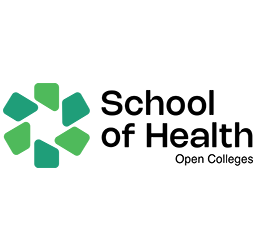

Graduate Diploma in Management
The Graduate Diploma in Management is an online postgraduate qualification that is ideal for busy senior managers, with a potential entry pathway through any of our Graduate Certificates and study that is highly supported, fits into your schedule, and...

Associate Degree of Sport Business (NSW Only)
Get a higher education qualification in two years when studying full-time! Based on the Bachelor of Sport Business in terms of content, the Associate Degree of Sport Business offers students the opportunity to get into the workforce quicker or alternat...
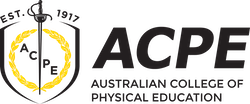
Bachelor of Dance Education (NSW Only)
The Bachelor of Dance Education is a unique specialist professional qualification and is Australia’s first–being delivered through ACPE! Units are provided by highly qualified and experienced professionals, empowering you with all the knowledge and ski...

Bachelor of Dance Practice (NSW Only)
The Bachelor of Dance Practice is a specialised degree that will equip you with the skills and experience to become a professional in the dance industry. The course develops artistry, choreography, performance, educational, business, and organisational...

Bachelor of Education (Physical & Health Education) (NSW Only)
The Bachelor of Education (Physical & Health Education) incorporates units in movement and health as well as curriculum and pedagogical studies, equipping you with the requisite skills for entering the teaching profession. If you are keen to pursue...

Bachelor of Health Science (Exercise) (NSW Only)
The Bachelor of Health Science (Exercise) offers the perfect career path for those looking to enhance their knowledge and skills through further studies in physiotherapy, exercise physiology, and other health professions. You will come to understand ho...

Bachelor of Sport Business (Leadership)
Turn your passion for sport into a career by immersing yourself in a degree that will broaden your theoretical and technical knowledge, so that you are fully equipped fora management role within the sport industry. The Bachelor of Sport Business (Leade...

Bachelor of Sports Coaching (Strength and Conditioning) (NSW Only)
To address the high demand for sport coaches and professionals in Australia, the Bachelor of Sport Coaching (Strength and Conditioning) is a specialist degree fostering the coaching, administrative, and professional skills necessary for a fulfilling ca...

Certificate IV in Fitness
Take the next step in your career and gain the qualification you need to become a Personal Trainer. If you currently work in the fitness industry as a Gym or Group Fitness Instructor, elevate yourself to the next level by studying the SIS40221 Certific...
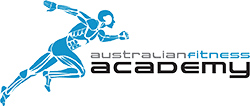
Certificate III in Fitness
If you’re looking to begin your career in the fitness industry, studying the SIS30321 Certificate III in Fitness is the perfect qualification to get you started. Gain all the knowledge and skills you need to enter the industry as a Gym Instructor or Gr...

Personal Trainer Course
Join the fitness industry as a Personal Trainer and turn your love for fitness into a rewarding career by graduating in both the SIS30321 Certificate III in Fitness & SIS40221 Certificate IV in Fitness. Enjoy the flexibility of being your own boss...

Bachelor of Health Science (Clinical Nutrition)
Clinical nutritionists integrate traditional food wisdom and current scientific evidence to motivate individuals and communities to eat well and live healthier lives. The Bachelor of Health Science (Clinical Nutrition) is supported by a strong underpin...

Bachelor of Health Science (Naturopathy)
Naturopathy is a whole medical system combining theory (philosophy and principles) and practise that uses an array of natural therapies to support healing and maintain health. Naturopaths aim to treat the underlying causes of illness and disease. The c...

Certificate III in Community Services (Perth Only)
Are you a natural when it comes to providing guidance to people? Would you like to kick start a career in Community Services? The Certificate III in Community Services (CHC32015) is the perfect entry-level qualification for prospective Community Servic...
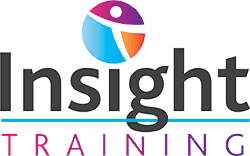
Certificate III in Individual Support (Ageing OR Disability) (Perth Only)
If you have a passion for helping those most in need, this qualification is one way you can utilise your knowledge for the benefit of others. Package the Certificate III in Individual Support (Ageing or Disability) (CHC33021) to save time and gain know...

Certificate lll in Early Childhood Education & Care (Perth Only)
If you love working with children and want to learn more about providing quality education and care in a range of environments, this course is for you. The Certificate lll in Early Childhood Education and Care (CHC30121) can provide you with an entry-l...

Certificate III in Individual Support (Disability) (SA Only)
The Certificate III in Individual Support (Disability) is designed to equip you with the practical skills and knowledge to support people living with disability in a variety of care settings. With a focus on person-centred support, you’ll learn how to...


Complete Personal Training & Business Course
AIPT has the perfect course to start your personal training business and hit the ground running with TWO nationally-recognised fitness qualifications – SIS30321 Certificate III & SIS40221 Certificate IV in Fitness – and access to The BSB50120 Diplo...
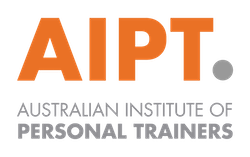
Diploma of Community Services (Perth Only)
The Diploma of Community Services qualification reflects the roles of community services, case management and social housing workers involved in the managing, co-ordinating and/or delivering of person-centred services to individuals, groups and communi...

